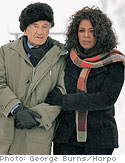What I Know for Sure

I'm sitting in a hotel room in Kraków, listening to Aretha Franklin sing "Amazing Grace." Poland is having an unseasonably cold winter. I've got on gospel music to both open and steel myself for the journey ahead. In a few hours, I will be standing at the gates of Auschwitz with Elie Wiesel, Holocaust survivor, humanitarian, Nobel Peace Prize winner.
Auschwitz—one of the great warnings to modern civilization that evil is real and it lives in the hearts of apparently civilized men. The site of the most notorious Nazi concentration camp is no doubt one of the ugliest places on earth.
Elie Wiesel has already met with my crew, which is filming our visit for our book club. "You must allow the silence to break through," he says. "There can be no second takes."
I completely understand. This is sacred ground and a sacred mission for me. Today is my birthday and I chose to be here, to bear witness, to honor and give new life to the memory of the dead.
I just reread Night , and I am full with sorrow. My heart aches again for the lives that were lost. I want to weep and shout and scream. Instead I try to meditate, sit still. Very still. Go to the place where silence reigns.
I can't. I'm bombarded by too many thoughts. How evil flourishes in a field of apathy. How the senseless destruction of life continues around the world, with people too busy to notice. I am more determined than ever to pay attention.
This year my fervent prayer is to be a channel for the deepest spiritual essence of my life. To know for sure that there are no ordinary moments. That to be alive is the most extraordinary thing we know.
I rifle through my luggage, looking for my long johns to wear to the death camps. A passage of Night is flashing in my brain: "'Strip! Hurry up! Raus!'… For us it meant true equality: nakedness. We trembled in the cold."
I say a prayer of thanks for the luxury of long johns, sweater, vest, jacket, Ugg boots, and pairs of gloves. Thank you.
I interviewed Elie Wiesel for the November 2000 issue of O . He told me then that only those who lived through the Holocaust can know what it was like, for language is an obstacle to describing it. But you cannot visit Auschwitz and ever be the same.
I close my eyes. Meditate. Stillness comes. I brace myself for the day. On my way to one of the bastions of inhumanity, I feel a sense of communion with the spirits of those who died and those who survived to bear witness. I have never felt more human.
Auschwitz—one of the great warnings to modern civilization that evil is real and it lives in the hearts of apparently civilized men. The site of the most notorious Nazi concentration camp is no doubt one of the ugliest places on earth.
Elie Wiesel has already met with my crew, which is filming our visit for our book club. "You must allow the silence to break through," he says. "There can be no second takes."
I completely understand. This is sacred ground and a sacred mission for me. Today is my birthday and I chose to be here, to bear witness, to honor and give new life to the memory of the dead.
I just reread Night , and I am full with sorrow. My heart aches again for the lives that were lost. I want to weep and shout and scream. Instead I try to meditate, sit still. Very still. Go to the place where silence reigns.
I can't. I'm bombarded by too many thoughts. How evil flourishes in a field of apathy. How the senseless destruction of life continues around the world, with people too busy to notice. I am more determined than ever to pay attention.
This year my fervent prayer is to be a channel for the deepest spiritual essence of my life. To know for sure that there are no ordinary moments. That to be alive is the most extraordinary thing we know.
I rifle through my luggage, looking for my long johns to wear to the death camps. A passage of Night is flashing in my brain: "'Strip! Hurry up! Raus!'… For us it meant true equality: nakedness. We trembled in the cold."
I say a prayer of thanks for the luxury of long johns, sweater, vest, jacket, Ugg boots, and pairs of gloves. Thank you.
I interviewed Elie Wiesel for the November 2000 issue of O . He told me then that only those who lived through the Holocaust can know what it was like, for language is an obstacle to describing it. But you cannot visit Auschwitz and ever be the same.
I close my eyes. Meditate. Stillness comes. I brace myself for the day. On my way to one of the bastions of inhumanity, I feel a sense of communion with the spirits of those who died and those who survived to bear witness. I have never felt more human.



